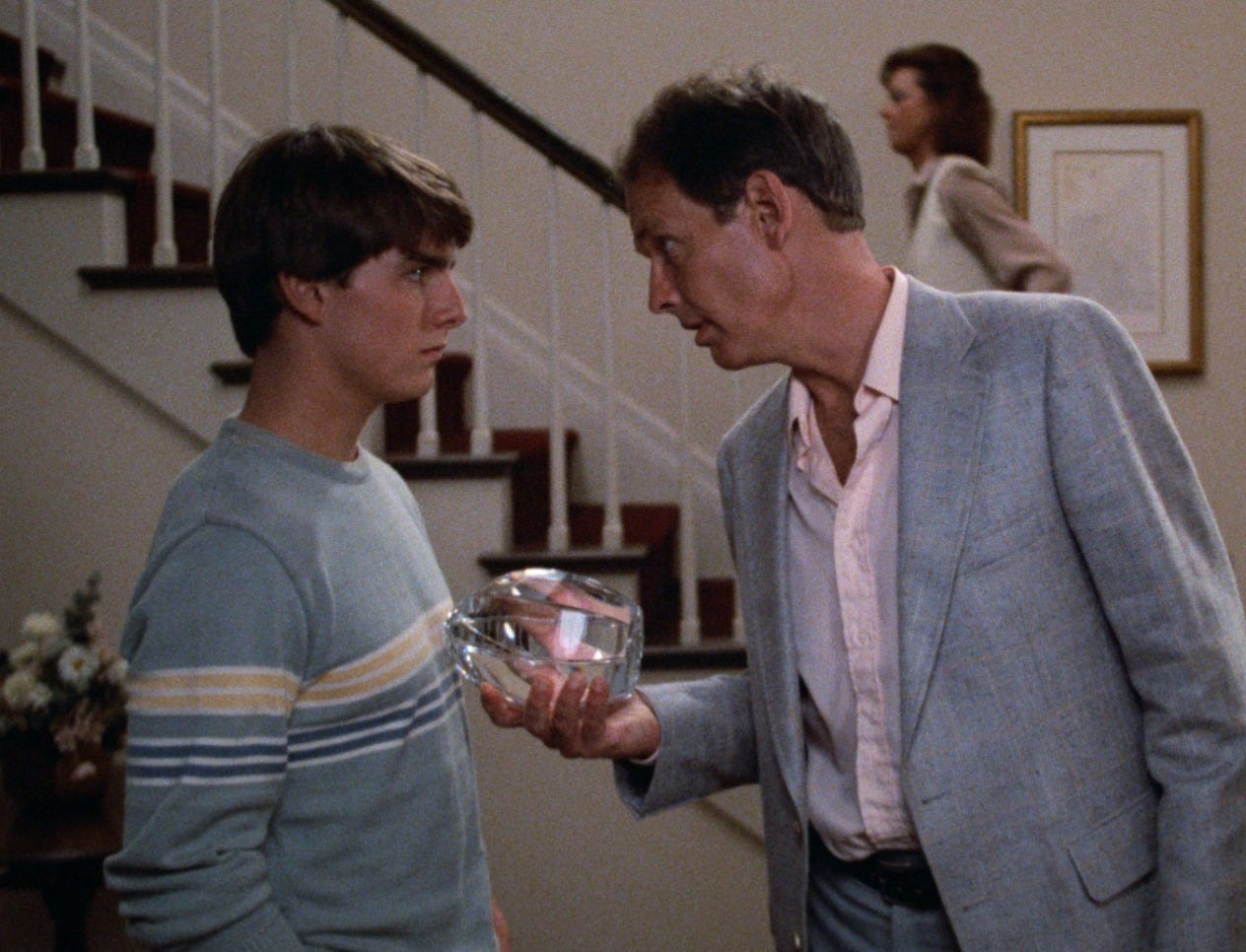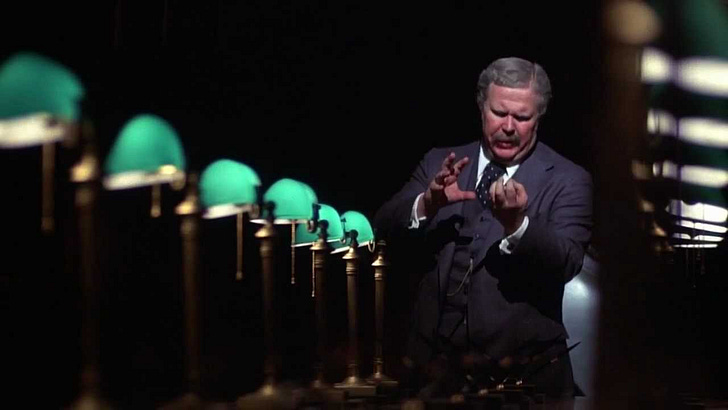Homo Economicus Part V- Paul Brickman's Risky Business (1983)
"It seems to me that if there were any logic to our language, trust would be a four letter word."
“I was dreaming' when I wrote this
So sue me if I go too fast
Life is just a party
And parties weren't meant to last
War is all around us
My mind says prepare to fight
So if I gotta die
I'm gonna listen to my body tonight”1
- “1999” by Prince
“I twist the truth, I rule the world, my crown is called deceit
I am the emperor of lies, you grovel at my feet
I rob you and I slaughter you, your downfall is my gain
And still you play the sycophant and revel in your pain
And all my promises are lies, all my love is hate
I am the politician and I decide your fate.”2
- “Orgasmatron” by Motörhead
The uncut version of Prince’s 1982 hit “1999” closes with a small child asking, “Mommy, why does everyone have The Bomb?” The unedited opening of the song is the following “Don’t worry. I won’t hurt you. I only want you to have some fun.” Prince isn’t singing this section, it’s a disembodied and unhuman voice. The bookends of the song were cut from the radio version; would the song have been a smash if these lines were left in? The radio versions message is total nihilism or “fun”, the uncut version is cynical self-awareness to the max.
In Motörhead’s, 1986 “Orgasmatron” no words are minced, and the message is direct, Lemmy didn’t have to worry about pop sensibilities. The message of the songs, despite the difference in genre and sonic styling have a similar point. They are products of the same Cold War Era and the “Reagan Revolution” milieu. But why the negativity? Why the self-conscious cynicism? What made this area different from others when similar elements were present?
As a millennial, I don’t have to conceptualize myself and everyone around me becomes powder in seconds. I know this is occasionally brought up today with Cold War 2.0, but no one actually takes it seriously, it’s a throwaway talking point that has no basis in reality, this was not the case during the real Cold War.3 The Boomers and Gen X take their share of abuse from younger generations, often rightfully so. But I don’t think it is taken into account as to what they had to deal with psychically. How could someone even process this happening? When viewed in these terms, the nihilism and pleasure for pleasures sake attitude makes sense. What control do I actually have? What am I supposed to do? A guy thousands of miles away who I’ve never met, whose name I can’t pronounce, could literally incinerate me with a press of a button. Imagine being told to huddle under a wooden desk to protect yourself from an atomic blast. With that level of insanity, one could only laugh in an attempt to take the edge off.
This era is where you are dropped in with 1983’s Risky Business. “The Bomb” is never mentioned and neither is Reagan. Hollywood used to produce movies that were written and directed with nuance and style. Now, we are left with ham-fisted, shrieking humiliation rituals or paint-by-numbers comic book movies. Watching Risky again, I was reminded of the opening minutes of David Lynch’s Blue Velvet (1986). The lily-white surface, the perfectly manicured lawns and gardens, blue skies, the cookie cutter houses, pleasantness and peace, the harmlessness of suburbia. But we look closer, deeper and see reality. The surface appearance is just that, an appearance, an act, a fraud. There is an unspoken dread and desperation until the crude and base interior cannot be held down anymore and explodes for all to see.
“Since this is the last speech that I will give as President, I think it's fitting to leave one final thought, an observation about a country which I love. You can go to live in France, but you cannot become a Frenchman. You can go to live in Germany or Turkey or Japan, but you cannot become a German, a Turk, or a Japanese. But anyone, from any corner of the Earth, can come to live in America and become an American.”
-President & Believer in Magic Dirt-Ronald Reagan’s Farewell Address 4
“Subversion (from Latin subvertere 'overthrow') refers to a process by which the values and principles of a system in place are contradicted or reversed in an attempt to sabotage the established social order and its structures of power, authority, tradition, hierarchy, and social norms.”5
Joel Goodson (Tom Cruise) is a junior or maybe a senior in high school (this isn’t made clear) and lives in Chicago’s North Shore. I believe the neighborhood that Joel lives in is what the great Thomas777 would call a “super zip”. Meaning a highly affluent and wealthy area. From the open, we see the surface level pleasantness and harmony is undermined, Joel is overcome by angst and pressure. He’s sexually frustrated, he’s not sure where to put this energy because he believes releasing this might “jeopardize his future” these two things are intertwined for him. Sex is seen as some kind of mysterious totem, a forbidden fruit that he wants but remains out of reach because it involves risk. He has a dream in which a naked girl dissolves into an SAT exam that he’s hours late for, “my life is ruined” he says. Joel is pledged by dread, doom and guilt. Why?
The tension and pressures Joel feels are impressed upon him, they aren’t natural, organic or due to self-infliction. He needs to do well on the SAT’s because he needs to go to a “good school” and if he doesn’t go to a good school, he won’t have a “future” and so on. We all are aware of this “Keeping up with the Joneses” mindset. But Joel doesn’t seem to want these things for himself, we never get the hint that he does. There are POV scenes where we the audience are led by the nose following Joel’s parents as they lecture, demand and condescend. Then, the worst thing happens to Joel-Freedom. Joel of course doesn’t see it that way, this liberation will provide him with much needed breathing room and relaxation, Joel is about to get a real education on what American “success” and “freedom” are. Joel’s parents have to leave town to visit an elderly relative and his descent begins.
There have always been pressures and responsibilities that burden human beings, its the human condition that must be dealt with post Fall. There is a wide chasm between organic pressures and imposed ones. Natural societal pressures are when organic communities are based on a shared heritage. When ethnos is maintained, enforced and gatekept the societal pressures are healthy and positive. When this isn’t the situation, social engineering is impressed which is then reinforced by the deracinated people within the inorganic community. This is the situation Joel is in and hence the cognitive dissonance he deals with. Instead of having natural and structured rites of passage men go through, in this case with sex, Joel is inundated with media, authority figures and other deracinated friends and people around him that dangle women and sex in front of his face while at the same time telling him that women and sex are dangerous, to be feared and unattainable.6 7
In medieval times and even for a time after, if a male was referred to as a “stud”, it was seen as a pejorative, a term meant to inflict shame on the person it was directed towards. If you were actually deemed a “stud” in those times you were a malcontent and shunned from participating in the society or possibly imprisoned. This pressure and gatekeeping didn’t have to come from the top down; it was handled by the peers or commoners in the community. A self-policing community, where standards are upheld is unthinkable in most parts of America today. What an organic unity is has been expressed by many. All that Joel’s culture has is a synthetic overlay of this, it’s not actually present, akin to the Blue Velvet example above.
Aristotle
“Thus then a single harmony orders the composition of the whole...by the mingling of the most contrary principles….The structural unity of the parts is such that, if any one of them is displaced or removed, the whole will be disjointed and disturbed. For a thing whose presence or absence makes no visible difference is not an organic part of the whole.”8
Art Composition
“Form: This is the “how”. This is what was used to create the final form in an art work. It is its total arrangement or organization. Included in Form are the principles and elements of design. Elements included are: line, shape, texture, value, and color. I often tell my students to burn these five elements into their brains. The principles of design include: harmony, variety, balance, proportion, dominance, movement, and economy.
Content: This is the “why”. For what reason was it created? What are the intentions or what is the artist/designer trying to tell us? Content is the emotional or intellectual message of a work of art; a statement, expression, or mood developed by the artist and interpreted by the observer.
Subject: This is the “what”. The subject for a work of art can be a person, object, a theme or an idea. This can include two areas. An Objective images/representational or Nonobjective images/nonrepresentational. So lets look at these two areas. Objective images/representational would be a design/art work that has a close representation of people or objects that can be clearly identified. Where as, nonobjective images/nonrepresentational would be when the subject does not refer to any physical object. The subject may be difficult for the observer to identify, since it is based solely on the elements of art rather than real-life people or objects.”9
Eastern Orthodoxy
“The flow of history confirms the reality of the Gospel: the Church is filled to overflowing with sinners. Does their presence in the Church reduce, violate or destroy her sanctity? Not in the least! For her Head--the Lord Christ, and her Soul--the Holy Spirit, and her divine teaching, her mysteries, and her virtues, are indissolubly and immutably holy. The church tolerates sinners, shelters them, and instructs them, that they may be awakened and roused to repentance and spiritual recovery and transfiguration; but they do not hinder the Church from being holy. Only unrepentant sinners, persistent in evil and godless malice, are cut off from the Church, either by the visible action of the theanthropic authority of the Church or by the invisible action of Divine Judgment, so that thus also the holiness of the Church may be preserved. "Put away from yourselves that wicked person" (I Corinthians 5:13).10
The suburb, like the one Joel lives in, is not something that came about organically. White people just didn’t decide to move out of cities to live next to strangers. This was actually imposed and enforced upon them via cunning methods of social engineering. The loss of ethnic cultures that collectivize together naturally in cities were destroyed over a few decades during the 20th century in America. E. Michael Jones explains below.
“The suburb as engine of assimilation was described by Myrdal a full ten years before William O. Whyte wrote his book. The discrepancy in time is easy enough to understand. Whyte was describing the suburban phenomenon empirically after it had happened. Myrdal was describing the intention behind the plan the foundations had concocted to solve the nationalities problem before the plan had been put into effect. In both a priori and a posterior accounts, the role class plays in assimilation is crucial. Neighborhoods have always had a dual identity in America. They functioned as an index of ethnicity but they also functioned as an index of class. The two indices were in fact related because certain ethnic groups traditionally occupied the upper-class neighborhoods (the WASP) and the lower-class neighborhoods (the blacks) and the neighborhoods in between (the ethnics).”11
Joel, as far as we can tell is a WASP, although there is no semblance of religiosity with Joel or his family, any Protestant confession has been stamped out, material gratification is meant to be God. Joel appears to have a higher minded and idealized vision of what he should do with his life as seen in the clip below. But Joel has nothing to backup and defend his view, this is met with humorous ridicule from his peers.
Freedom is a problem because Joel is totally incapable of handling any semblance of it and it becomes obvious, he’s never experienced this before. Once his parents leave, we see Joel attempting to eat a microwave dinner that is still frozen, he pours a glass of whiskey and coke that is all whiskey and no coke. Joel isn’t functional in basic and rudimentary ways. Keep in mind he’s a few months away from being on a college campus with no direct supervision. These scenes are played for laughs, and they are humorous but there is something deeper and sinister being expressed, that modern culture and all that comes with it manipulates and stunts natural development to adulthood.
Joel knows how to go to school and do his homework and that’s about it. Because of Joel’s insulation and naivete he is a perfect mark to be used and manipulated, enter the “Hooker with a Heart of Gold” Lana and Guido “The Killer Pimp”. Lana, played by Rebecca De Mornay, turns this classic trope on its head, she is savvy, cutthroat and intelligent, using Joel’s desires against him. Joel, out of desperation, needs a way out. Lana offers it to him, which is the weaponization of base desires for maximum profit. This is how you “get ahead” or how you “make it”. What’s the point of accomplishing anything meaningful? Money, in of itself is “success”. As Henry Hill says in Goodfellas: “For us to live any other way was nuts. Uh, to us, those goody-good people who worked shitty jobs for bum paychecks and took the subway to work every day, and worried about their bills, were dead. I mean they were suckers. They had no balls. If we wanted something we just took it.”
This is Joel’s engineered alchemical initiation into adulthood, and he realizes that in this culture and this paradigm; everyone uses everyone, you either play the game or you are a loser who’s “never gonna to make it”. This behavior is even unwittingly approved of by his parents, Joel gains acceptance to the Ivy League, not by performance or merit but by weaponizing passions the same way it was done to him. The original ending is bleaker and emptier than the one that ended up being shown in theaters. The juxtaposition between his high school classmates “Future Enterprisers” products and Joel’s “human fulfillment” make clear how to get to the top in America.12
1999 by Prince
Orgasmatron by Motörhead
The Strategy of Subversion: Manipulating the Politics of Other Nations, by Paul Blackstock
The Boomer Truth Regime-Academic Agent
The Red Pill-Dr. Matthew Raphael Johnson
The Essential Aristotle by Aristotle p.463
The Slaughter of Cities: Urban Renewal as Ethic Cleansing by E. Michael Jones pg.121
Jon Avnet on his film RISKY BUSINESS | AFI Movie Club









The director's cut ending is powerful! Never saw that before.
Besides being a great actor, Tom Cruise is also actually dyslexic. He must have felt that great pressure personally that his character faces in the film. I always wonder about those actors and actresses who end up playing roles that parallel their own personal struggles. One of my favorites is “Leaving Las Vegas” with Nicholas Cage in one of his most brutal roles. It sobered me up and never touched a drop since watching that over two decades ago. I imagine he struggled with similar temptations and was able to channel that into his acting.